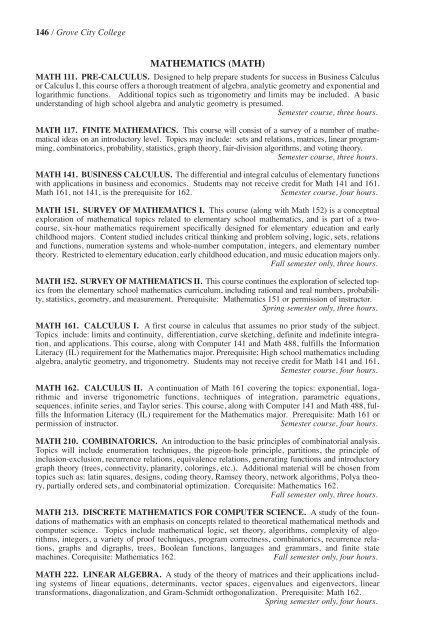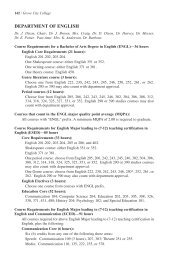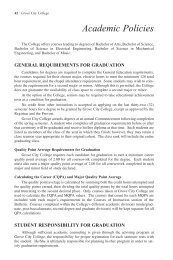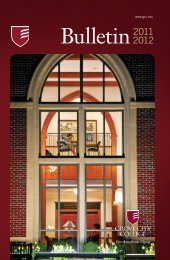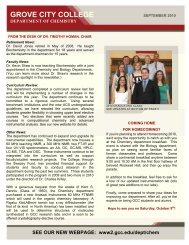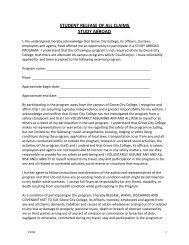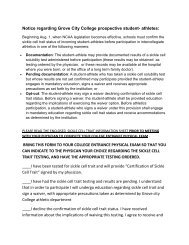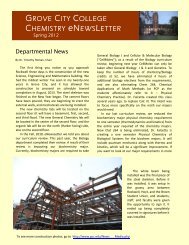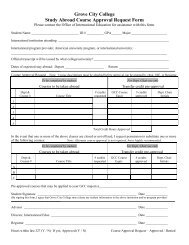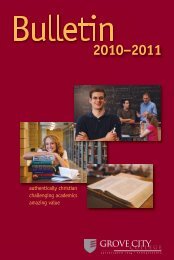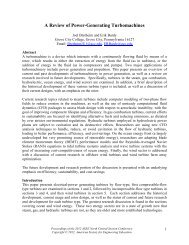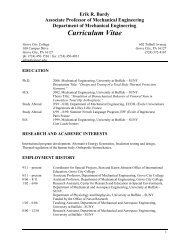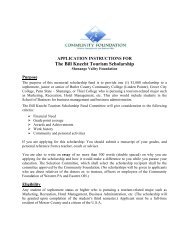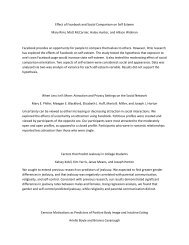2009–2010 - Grove City College
2009–2010 - Grove City College
2009–2010 - Grove City College
Create successful ePaper yourself
Turn your PDF publications into a flip-book with our unique Google optimized e-Paper software.
146 / <strong>Grove</strong> <strong>City</strong> <strong>College</strong><br />
MATHEMATICS (MATH)<br />
MATH 111. PRE-CALCULUS. Designed to help prepare students for success in Business Calculus<br />
or Calculus I, this course offers a thorough treatment of algebra, analytic geometry and exponential and<br />
logarithmic functions. Additional topics such as trigonometry and limits may be included. A basic<br />
understanding of high school algebra and analytic geometry is presumed.<br />
Semester course, three hours.<br />
MATH 117. FINITE MATHEMATICS. This course will consist of a survey of a number of mathematical<br />
ideas on an introductory level. Topics may include: sets and relations, matrices, linear programming,<br />
combinatorics, probability, statistics, graph theory, fair-division algorithms, and voting theory.<br />
Semester course, three hours.<br />
MATH 141. BUSINESS CALCULUS. The differential and integral calculus of elementary functions<br />
with applications in business and economics. Students may not receive credit for Math 141 and 161.<br />
Math 161, not 141, is the prerequisite for 162. Semester course, four hours.<br />
MATH 151. SURVEY OF MATHEMATICS I. This course (along with Math 152) is a conceptual<br />
exploration of mathematical topics related to elementary school mathematics, and is part of a twocourse,<br />
six-hour mathematics requirement specifically designed for elementary education and early<br />
childhood majors. Content studied includes critical thinking and problem solving, logic, sets, relations<br />
and functions, numeration systems and whole-number computation, integers, and elementary number<br />
theory. Restricted to elementary education, early childhood education, and music education majors only.<br />
Fall semester only, three hours.<br />
MATH 152. SURVEY OF MATHEMATICS II. This course continues the exploration of selected topics<br />
from the elementary school mathematics curriculum, including rational and real numbers, probability,<br />
statistics, geometry, and measurement. Prerequisite: Mathematics 151 or permission of instructor.<br />
Spring semester only, three hours.<br />
MATH 161. CALCULUS I. A first course in calculus that assumes no prior study of the subject.<br />
Topics include: limits and continuity, differentiation, curve sketching, definite and indefinite integration,<br />
and applications. This course, along with Computer 141 and Math 488, fulfills the Information<br />
Literacy (IL) requirement for the Mathematics major. Prerequisite: High school mathematics including<br />
algebra, analytic geometry, and trigonometry. Students may not receive credit for Math 141 and 161.<br />
Semester course, four hours.<br />
MATH 162. CALCULUS II. A continuation of Math 161 covering the topics: exponential, logarithmic<br />
and inverse trigonometric functions, techniques of integration, parametric equations,<br />
sequences, infinite series, and Taylor series. This course, along with Computer 141 and Math 488, fulfills<br />
the Information Literacy (IL) requirement for the Mathematics major. Prerequisite: Math 161 or<br />
permission of instructor. Semester course, four hours.<br />
MATH 210. COMBINATORICS. An introduction to the basic principles of combinatorial analysis.<br />
Topics will include enumeration techniques, the pigeon-hole principle, partitions, the principle of<br />
inclusion-exclusion, recurrence relations, equivalence relations, generating functions and introductory<br />
graph theory (trees, connectivity, planarity, colorings, etc.). Additional material will be chosen from<br />
topics such as: latin squares, designs, coding theory, Ramsey theory, network algorithms, Polya theory,<br />
partially ordered sets, and combinatorial optimization. Corequisite: Mathematics 162.<br />
Fall semester only, three hours.<br />
MATH 213. DISCRETE MATHEMATICS FOR COMPUTER SCIENCE. A study of the foundations<br />
of mathematics with an emphasis on concepts related to theoretical mathematical methods and<br />
computer science. Topics include mathematical logic, set theory, algorithms, complexity of algorithms,<br />
integers, a variety of proof techniques, program correctness, combinatorics, recurrence relations,<br />
graphs and digraphs, trees, Boolean functions, languages and grammars, and finite state<br />
machines. Corequisite: Mathematics 162. Fall semester only, four hours.<br />
MATH 222. LINEAR ALGEBRA. A study of the theory of matrices and their applications including<br />
systems of linear equations, determinants, vector spaces, eigenvalues and eigenvectors, linear<br />
transformations, diagonalization, and Gram-Schmidt orthogonalization. Prerequisite: Math 162.<br />
Spring semester only, four hours.


